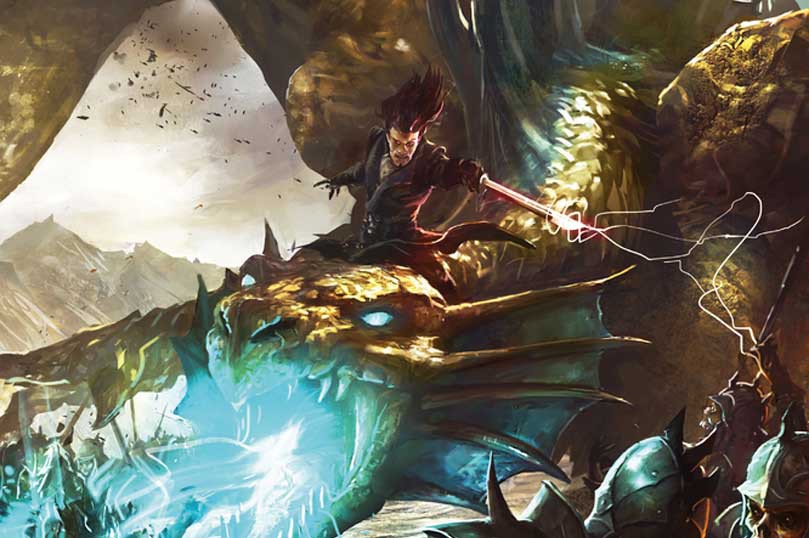
Written by James L. Sutter
As the editor in charge of Pathfinder Tales—the Tor and Paizo novel line that tie into the Pathfinder Roleplaying Game—as well as the author of two of the books myself, I spend a lot of time talking with people about the boons and challenges of writing fiction tied into a game. But what’s often easy to overlook in these conversations is just how much RPGs can teach us about the craft of writing.
The most important thing we learn from pen-and-paper roleplaying games is that anyone can be a storyteller. Books, movies, TV, video games—all of these can inspire a would-be writer, but the audience’s role is still fundamentally passive. These media are fun, but do nothing to fill the chasm separating us from creative “professionals”: the gulf between “Wow, that was cool,” and “I want to do what they did!” At the end of the day, we’re still standing outside the dream factory looking in.
 Roleplaying games burst right through that wall, Kool-Aid-Man style. By their very nature, RPGs force audience members to take control, to see themselves as storytellers. RPGs are improv, and even the best-written adventure module is still only a stage for the participants. Creativity is mandatory, and as people game, they come to identify as creative. I can’t count the number of professional authors I’ve met who were drawn into writing by the urge to create more elaborate backstories for their characters, or settings for their game, or journals of their parties’ adventures. Gaming breeds writers like salad bars breed bacteria.
Roleplaying games burst right through that wall, Kool-Aid-Man style. By their very nature, RPGs force audience members to take control, to see themselves as storytellers. RPGs are improv, and even the best-written adventure module is still only a stage for the participants. Creativity is mandatory, and as people game, they come to identify as creative. I can’t count the number of professional authors I’ve met who were drawn into writing by the urge to create more elaborate backstories for their characters, or settings for their game, or journals of their parties’ adventures. Gaming breeds writers like salad bars breed bacteria.
A writer can gain much more from gaming than simple confidence. By running games—and being lucky enough to work on Dungeon magazine and help create Pathfinder—I got an invaluable education in crafting worlds, plots, and characters.
Designing your own setting is one of the great joys of RPGs, and packed with lessons for writing science fiction and fantasy. It’s where I learned that I could combine tropes from vastly different real-world cultures to make societies that feel brand new yet relatable. That magic without logically consistent laws is boring, and that the constraints those rules impose are half the fun. That even your purest “good” gods or nations are more interesting when they have flaws, and vice versa. That money and geography determine your national borders, and that rivers should always flow downhill and together rather than splitting apart. (You’d be amazed how many fantasy maps ignore that fact.)
 Writing an adventure is excellent training for plotting a novel. It needs all the same elements—the hooks and clues that draw the protagonists in, the rising action, the climactic battle—but comes with the added challenge that you don’t get to control the heroes. You’re writing a script that could change wildly at any moment if the characters zig when you expected them to zag—not unlike adapting a novel outline to fit unexpected character developments or editorial requests.
Writing an adventure is excellent training for plotting a novel. It needs all the same elements—the hooks and clues that draw the protagonists in, the rising action, the climactic battle—but comes with the added challenge that you don’t get to control the heroes. You’re writing a script that could change wildly at any moment if the characters zig when you expected them to zag—not unlike adapting a novel outline to fit unexpected character developments or editorial requests.
As for characters—well, they’re the heart of roleplaying, aren’t they? And as every roleplayer learns, the more you know about a character’s background and personality, the easier it is to get into their heads and create realistic reactions to any situation.
Fiction and roleplaying games are just two different styles of storytelling, so whether you’re rolling dice or pounding a keyboard, you’re exercising the same muscle. Each makes us better at the other.
Preorder Pathfinder Tales: Lord of Runes today:
Amazon | Barnes & Noble | Books-a-Million | iBooks | Indiebound | Powell’s
Follow James L. Sutter on Twitter at @jameslsutter, on Facebook, or visit him online.







I’ve been a writer longer than I’ve been a roleplayer (nearly 30 years versus 10 or 11), but I’ve gotten loads of story ideas from playing in various games. And sometimes just from making a character for a game. Now to actually finish some of those stories…
RPG characters are great, even the ones that just appear once. I have to admit that I’ve borrowed some of my character designs from a couple games well.
You make some good points, and there are a few I’d argue against, but the one that really stands out is the statement that in an RPG you don’t get to control the protagonists.
What I’ve found in practice is that a well-written character won’t always do what you want them to. They truly are closer to a player character than just something that follows the railroad tracks of the plot. The only difference is that the writer themselves gets to play all the characters.
If you set up a character’s motivations and reasons for doing things properly though, there are going to be points in your story where you’ll find that it simply wouldn’t be in-character for your protagonist to do something you want them to. More than that, as you get to know your characters better, just like in an RPG, you find they tend to start surprising you, expanding beyond their initial constraints and gaining a truly well-rounded personality of their own over time.
I’ve ghostwritten a few novels now, I’ve written for MMORPGs, children’s games, and am now working on a TTRPG. The lessons you learn in any of these things carries over to the others as remarkably translatable skills. It’s not just what role playing teaches writers – it’s also what writing teaches role players. Learning how to build the evolutionary history of a world is a trait I learned as a world designer in my writing, but in my role playing I carry it forward, including things like magic and how it applies to the flora and fauna, or the application of Chekhov’s gun.
Beyond understanding literary rules, however, the most important part is knowing when to break them, and role playing’s a great way to organically test when and where these situations are appropriate, with immediate results in real-time. It’s nearly impossible to get good criticism that’s actually useful for writing. “I liked it” is nice for the ego and all, but it just doesn’t tell you anything of value as to which sections worked and which didn’t. Sitting across from someone at the table, you can see when they start to fidget, when they start checking over their spot check chance, the grimace that plays across their face when the plot twist reveals they’d just given the enemy the very weapon needed to destroy the kingdom.
The best GMs I’ve played with have all been writers, even if not professional ones. Their writing gives them the lessons of structure and how to apply revisions to update and enhance their worlds methodically. The best writers I’ve known personally have also often been role players. They’re related skills, so it only makes sense for one to play off the other. As you said, they’re just two types of storytelling.
Anyway, thanks for your thoughts on the matter! I’d really recommend the point that if people want to get into working in games or writing, then role playing’s a great starting point. Nearly everything you learn in role playing can be carried over elsewhere!